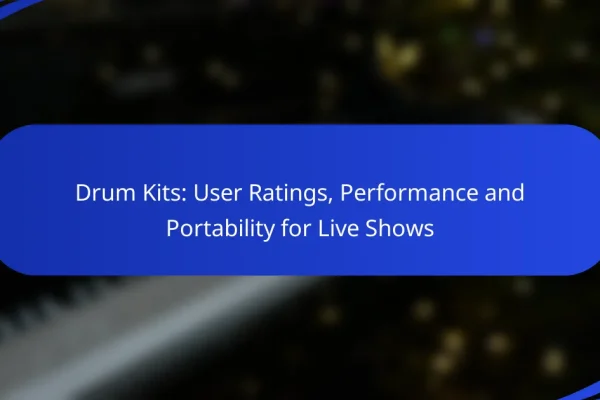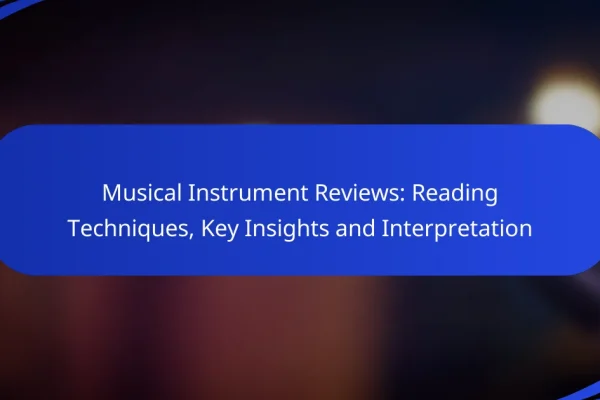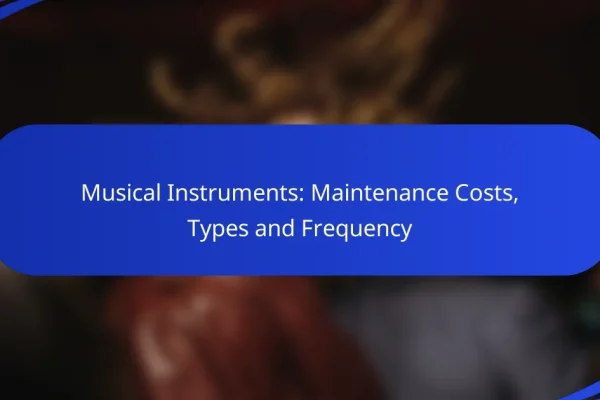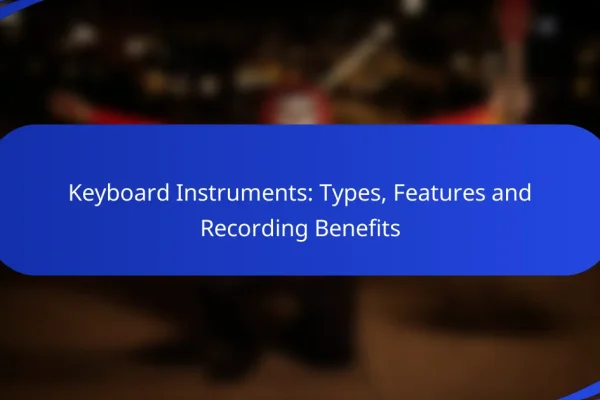
Musical Instruments: Best Deals, Sales Events and Discounts
If you’re looking for the best deals on musical instruments, major retailers like Guitar Center,…
Welcome to your ultimate online buying guide for musical instruments, where you'll discover essential tips for selecting the perfect instrument to match your musical journey. Whether you're a beginner or an experienced musician, understanding your preferences and budget is crucial in making an informed decision. Explore a variety of options available online, ensuring you find the right fit for your aspirations and lifestyle.

If you’re looking for the best deals on musical instruments, major retailers like Guitar Center, Sweetwater, and Sam Ash frequently offer significant discounts during sales events and seasonal promotions. Key shopping days such as Black Friday and Labor Day are perfect opportunities to find lower prices on a wide range of instruments. To maximize your…

Pianos are a harmonious blend of craftsmanship and sound quality, with top brands like Steinway & Sons and Yamaha setting the standard for excellence. The meticulous attention to detail in their construction not only enhances tonal richness but also ensures durability and playability. When selecting a piano, it’s essential to consider factors such as type,…

Choosing the right drum kit for live shows involves balancing portability, performance, and user ratings. These kits must endure the demands of touring while ensuring high-quality sound and quick setup. User ratings provide valuable insights into a kit’s reliability and satisfaction, helping musicians make informed decisions for their performances. What are the best drum kits…

Exploring musical instrument reviews can greatly enhance your understanding and selection process, especially for beginners. By focusing on expert insights and user experiences, you can make informed decisions based on sound quality, build quality, and value for money. This guide will help you navigate the essential aspects of reading reviews to find the perfect instrument…

Exploring the world of piano tutorials on YouTube reveals a variety of channels that cater to different learning styles and skill levels. With engaging content from creators like Hoffman Academy and Andrew Huang, both beginners and advanced players can find valuable resources to enhance their skills. Understanding the diverse teaching styles and effective engagement strategies…

Maintaining musical instruments is essential for ensuring their longevity and optimal performance, with costs varying significantly depending on the type and condition of the instrument. Regular upkeep can range from modest expenses for basic care to substantial costs for complex repairs, often influenced by the instrument’s usage and environmental factors. Understanding the specific maintenance needs…

Keyboard instruments encompass a wide range of types, including pianos, organs, synthesizers, and digital keyboards, each with distinct features and sound production methods. When choosing an instrument, it’s essential to consider aspects like key action, sound engine quality, and connectivity options, as these factors influence playability and sound quality. Additionally, keyboard instruments greatly enhance recording…

When comparing acoustic and electric guitars, it’s essential to consider their distinct features, sound characteristics, and playability. Acoustic guitars, with their hollow bodies, provide a natural amplification of sound and are often favored by beginners for their simplicity. In contrast, electric guitars utilize electronic pickups to create a diverse range of tones, appealing to players…

The trumpet and trombone are excellent choices for students in the USA, as they are widely accessible and commonly featured in school music programs. Each instrument offers unique characteristics; the trumpet produces a bright, piercing tone, while the trombone’s sliding mechanism allows for a warmer sound and greater pitch range. When selecting a brass instrument,…

Choosing the right electric guitar as a beginner is crucial for developing your skills and enjoying the learning process. The best options balance playability, affordability, and versatility, ensuring that new players can comfortably navigate their musical journey. With a price range typically between $100 and $700, it’s important to consider features like neck profile and…
For beginners, the best musical instruments are those that are relatively easy to learn, affordable, and versatile. Instruments like the guitar, piano, ukulele, drums, and violin are popular choices due to their accessibility and the wide range of music they can produce.
The guitar is a favored instrument for beginners because of its popularity and the vast array of learning resources available. Acoustic guitars are often recommended for their simplicity and lower cost, typically ranging from $100 to $500 for a decent starter model.
When starting, focus on learning basic chords and strumming patterns. Many beginners find success with online tutorials and apps that provide structured lessons. Avoid overly complicated songs at first to build confidence and skill gradually.
The piano is an excellent choice for beginners due to its visual layout and the ability to play multiple notes simultaneously. Digital pianos and keyboards can be found for around $200 to $800, making them accessible for most budgets.
Start with simple melodies and scales to develop finger strength and coordination. Consider using beginner books or online courses that emphasize reading sheet music and understanding music theory, as these skills will greatly enhance your playing ability.
The ukulele is a small, four-string instrument that is easy to learn and play, making it ideal for beginners. Prices typically range from $50 to $300, depending on the quality and brand.
Begin with basic chords and simple strumming techniques. The ukulele's lightweight and portable nature allows for practice anywhere, and its cheerful sound makes learning enjoyable. Look for online resources that focus on popular songs to keep motivation high.
Drums are a dynamic choice for beginners who enjoy rhythm and percussion. A basic drum kit can cost anywhere from $300 to $1,000, while electronic drum pads may be more affordable and space-efficient.
Start with basic beats and rhythms to develop timing and coordination. Many beginners benefit from taking lessons or using apps that provide structured practice routines. Avoid overwhelming yourself with complex patterns early on; focus on mastering simple rhythms first.
The violin is a beautiful instrument that offers a rich musical experience, though it can be challenging for beginners. Starter violins typically range from $100 to $500, and it’s important to choose one that is properly sized for comfort.
Focus on learning proper bowing techniques and finger placement. Consider enrolling in lessons or using online video tutorials to guide your practice. Patience is key, as developing a good sound on the violin takes time and consistent effort.
Choosing the right musical instrument involves understanding your personal preferences, budget, and practical considerations. By evaluating these factors, you can select an instrument that suits your musical aspirations and lifestyle.
Your musical style significantly influences the type of instrument you should choose. For example, if you enjoy rock or pop, electric guitars or keyboards may be ideal, while classical music enthusiasts might prefer violins or pianos.
Think about the genres you are passionate about and the sounds you want to create. Research different instruments associated with those styles to narrow down your options.
Budget is a crucial factor when selecting a musical instrument. Prices can vary widely, from affordable beginner options to high-end professional models. Set a realistic budget that includes not just the instrument but also accessories like cases, stands, and maintenance tools.
For beginners, consider starting with instruments in the low hundreds of USD. As you progress, you can invest in higher-quality gear. Always check for used instruments, which can offer significant savings.
Instrument size and weight can affect your comfort and ability to play. Larger instruments like pianos or cellos may require more space and physical strength, while smaller instruments like ukuleles or flutes are more portable.
Consider how often you will transport the instrument. If you plan to take it to lessons or gigs, a lightweight option might be more practical. Always try holding the instrument before purchasing to ensure it feels comfortable.
Different instruments require varying levels of maintenance and care. For instance, string instruments need regular tuning and string changes, while woodwinds may require cleaning and pad replacements. Understanding these needs can help you choose an instrument that fits your lifestyle.
Research the maintenance requirements of your preferred instruments. Some may require professional servicing, while others can be easily maintained at home. Factor these ongoing costs into your budget to avoid surprises later on.
You can buy musical instruments online from various retailers that cater to different needs and budgets. Consider factors like product variety, pricing, shipping options, and customer service when choosing a platform.
Amazon offers a vast selection of musical instruments, from beginner to professional levels. You can find everything from guitars and keyboards to percussion instruments and accessories.
When shopping on Amazon, pay attention to customer reviews and ratings, as they can provide insights into product quality. Additionally, consider Amazon Prime for faster shipping options and potential discounts.
Guitar Center specializes in guitars, amplifiers, and related gear, making it a go-to for string instrument enthusiasts. They offer both new and used instruments, catering to a wide range of budgets.
In-store pickup can be an option if you prefer to try before you buy. Guitar Center also frequently runs promotions, so check their website for deals on popular brands.
Sweetwater is known for its extensive inventory of music gear, including instruments, recording equipment, and accessories. They provide detailed product descriptions and customer support to help you make informed decisions.
Sweetwater often includes free shipping on orders over a certain amount, which can be beneficial for larger purchases. Their customer service is highly rated, offering personalized assistance for your musical needs.
Reverb is a marketplace specifically for buying and selling used musical instruments. It features a wide range of vintage and unique items that may not be available elsewhere.
When purchasing from Reverb, check the seller's ratings and return policies to ensure a smooth transaction. Prices can vary significantly, so compare listings to find the best deal on the instrument you want.
The top brands for musical instruments include Yamaha, Fender, and Roland, each known for their quality and innovation in specific categories. Choosing a reputable brand can enhance your playing experience and ensure reliability in performance.
Yamaha is a leading brand for keyboards, offering a wide range of digital pianos and synthesizers suitable for beginners to professionals. Their instruments are known for their realistic sound and user-friendly interfaces.
When selecting a Yamaha keyboard, consider features such as weighted keys, built-in sounds, and connectivity options. Models like the Yamaha P-series are popular for their portability and sound quality, making them ideal for both practice and performance.
Fender is synonymous with electric guitars, particularly the Stratocaster and Telecaster models, which are staples in many music genres. Their guitars are celebrated for their craftsmanship, tone, and playability.
When choosing a Fender guitar, think about the type of music you want to play and your skill level. Entry-level models like the Fender Player series offer great value, while professional models can be a worthwhile investment for serious musicians.
Roland specializes in electronic instruments, including synthesizers, drum machines, and digital pianos. Their products are known for cutting-edge technology and high-quality sound, appealing to both live performers and studio musicians.
For those interested in electronic music, consider Roland's popular models like the TR-8S drum machine or the Juno series synthesizers. These instruments often come with extensive features, allowing for creative flexibility in music production.